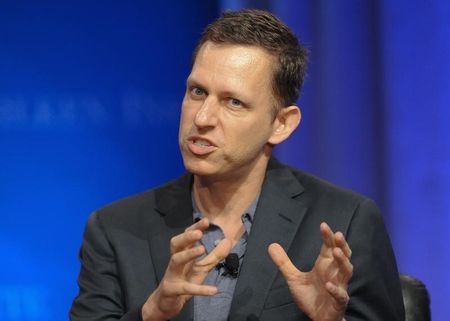By Sarah McBride
SAN FRANCISCO (Reuters) - Forget striving for a well-rounded resume.
According to a new book from Peter Thiel, the investor and PayPal co-founder, well-roundedness amounts to "many-sided mediocrity." Instead, his "Zero to One" urges entrepreneurs to "focus relentlessly on one thing you're good at doing."
And yet this very readable and provocative book by Thiel, a Stanford graduate with a degree in philosophy, draws on sources from Shakespeare to Roman history to Lady Gaga and amounts to a testament to the value of generalisation.
Given his success founding a payments company, launching three well-known investment firms, and now writing a bestselling book, the same could be said for Thiel.
And it turns out his views on well-roundedness are more nuanced than they may first appear.
"I come out against doing a scattered set of disconnected activities, which is what kids are encouraged to do to get into top universities," said Thiel in an interview on Wednesday. He funds a fellowship that gives $100,000 grants to youngsters, from high school age to 23, who forgo school or drop out to pursue a project.
"Good entrepreneurs have a fairly broad understanding of markets and fields," he said, arguing that is not at odds with his book's position that a good entrepreneur determines the one best thing to do and then does it.
"Zero to One" is an example of how the most respected start-up investors, often little known outside Silicon Valley, wield influence that is based as much in their creative thinking as in the big checks they write.
While others in the group, such as venture capitalists Marc Andreessen and Bill Gurley, regularly share their wisdom over blogs and Twitter, Thiel has until now held back.
His first tweet, a link to the Amazon listing for the new book, went out earlier this month.
"Zero to one tweets," he joked when asked about his Twitter background.
"I'm always uncomfortable throwing ideas out there that are half baked," he added.
But that doesn't mean he's uncomfortable throwing out ideas about Twitter. On his book tour, he told CNBC that the service was mismanaged and its executives probably smoked a lot of pot.
In a subsequent interview with Reuters, he said he meant Twitter executives have not developed the product as well as they should.
"One always has the sense there's potential being missed," he said.
Twitter Chief Executive Dick Costolo came up with his own tongue-in-cheek retort.
"Working my way through a giant bag of Doritos," he tweeted in an exchange with Jason Goldman, an early employee at Twitter. "I'll catch up with you later."
In his book, Thiel takes on capitalism's obsession with competition—he prefers monopolies, defined as finding an untapped market.
"Zero to one" refers to starting something from scratch, going from nothing to something, which he says is more challenging and much more important than refining an existing idea.
He also disparages Silicon Valley's obsession with disruption, which he writes has become "a self-congratulatory buzzword for anything trendy." More disturbingly, he argues, it encourages entrepreneurs to define themselves against existing companies, rather than thinking in big, fresh ways.
Thiel plays down the role that chance and background play in individual success, urging readers to take control of their destiny. "You are not a lottery ticket," he writes.
But many of the examples he throws out of entrepreneurs who have done the best job of harnessing success, including Jeff Bezos, Bill Gates, and Warren Buffett, belie that point of view. They typically hail from comfortable backgrounds that provided strong educations and easy connections with those who helped them make their marks.

"It's true that already successful people have an easier time doing new things," he allows in the book.
(Reporting by Sarah McBride, editing by Peter Henderson)
4_800x533_L_1412522645.jpg)